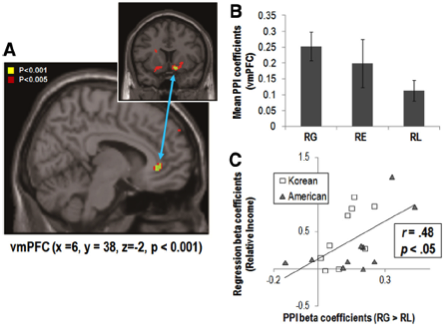Contrary to traditional economic models, social comparison influences subjective utility and decision-making such that our decisions are influenced not only by absolute payoffs but also by relative income difference between self and others.
We examined the behaviors and neural response patterns of Korean (i.e., interdependent culture) and American (i.e., independent culture) participants while performing a financial gambling task simultaneously and independently with a partner.
Upon seeing the partner’s income, greater modulation of the activity in the ventral striatum (VS) and the ventromedial prefrontal cortex (vmPFC) by relative gain was observed in Korean than American participants, suggesting greater sensitivity of Koreans toward social comparison. The strength of functional connectivity between the VS and the vmPFC predicted individual variability in the degree to which participants’ decisions were affected by relative incomes. (Kang et al., Journal of Neuroscience, 2013)




